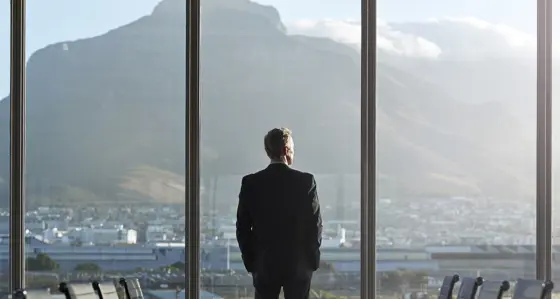
Permission to Transition: Enabling a ‘just’ and society led transition
Original audio available here.
Emily Farrimond, Baringa: Welcome to our ESG podcast, where today we are going to talk about permission to transition and the interrelationship between climate change and society and how that's required to work seamlessly together in order to enable us to reach net zero.
To start, I want to introduce Rishi Madlani, and to hear how you got involved in sustainability and how that plays through into your work as well as your personal life.
Rishi Madlani, Natwest: Lovely to see you in person today after two long years of pandemic and lockdowns. I am sustainability person through and through, it's been in my bloodstream since my university days. I was campaigning for low carbon solutions on halls and in campuses, and I’m delighted to say that you can visit the solar panels on the London School of Economics’ new buildings any time you want; and campaigning student reuse schemes. It was always in my passion, but I knew I need to get a job and pay off some of that student debt, but also try to make a bigger impact.
When I applied at banks and in the financial sector, as an economist, I was lured by the dollar signs to try improve my life. I applied to the top-rated sustainability bank at the time, which was ABN Amro back in 2004. It was the FT's top sustainability bank, and I was always looking at this in where I wanted to take my career and been really lucky to work across a number of products. But in the last 13-14 years, I was focused on climate, whether that’s financing 500 megawatts of renewables around the UK or whether that's setting NatWest's ambitious climate strategy.
I eat, sleep and breathe this – outside the bank, I am an elected Councillor in Camden, representing the Bloomsbury ward. Subject to the will of the people, in a few weeks’ time, will hopefully re-elected. I chair Camden's Pensions Committee where we have won awards for our approach to ESG, we can really push the boundaries on what we're doing there. Similarly, I serve on the culture and environment committee where I've been able to campaign for more low carbon transport, as well as our new green municipal investment, open through Abundance. I really do eat, dream and sleep this stuff.
Emily Farrimond, Baringa: It's great to know that, like us, there are people out there who genuinely think about this all the time and are really concerned about how we move to a to a low carbon society. We've also got Tom Orr with us. I know you know him very well, Rishi, but I wanted to allow Tom the chance to introduce himself and explain how he eats, sleeps and breathes sustainability.
Tom Orr, Baringa: I've previously worked very closely with NatWest Group Strategy Team, but we worked across all things sustainability. Rishi was probably quite a big influence on my desire to go from a generic strategy role into something that is 100 per cent sustainability.
Emily Farrimond, Baringa: Rishi, what do you see as the main barriers, but also the enablers to the transition to net zero?
Rishi Madlani, Natwest: We have got to firstly acknowledge where we've got to now. We are in a totally different space from where we were 10 years ago when my mentor at the time was telling me to keep away from this climate change as it might be a bit niche. More recently, the topic has moved up in public consciousness, and also in business consciousness. The COP Summit last year really increased our focus across the UK. What we still see though is a will to act. We still see big barriers around knowledge and around concerns about what technologies will be there and what these future strategies will be required. Some of this comes down to issues and challenges of long term government policy. We saw the energy strategy released recently with a huge gaping hole in it of energy demand reduction. Energy efficiency is not sexy, but it has to be part of our solution. We need these long-term directional policy strategies. We know that government will be coming out with a new green finance strategy later in the year, so we see that direction, but it really needs to be more ambitious and faster. There's a real risk of not moving fast enough. On the positive, in terms of the enablers, we're seeing vast capital flows move to the sector. Whether it’s the 100-billion-pound commitment we've made by 2025 to have climate sustainable finance funding or it's one hundred and thirty trillion dollars that Mark Carney promised as part of the net zero action on net zero banking alliance at COP. So, we're seeing capital flows move towards these assets, but there’s still not the knowledge, there’s still restriction of where this capital could flow.
Tom Orr, Baringa: There's something very different about net zero when you're coming from a bank or an asset manager in that there’s a requirement to live with a level of ambiguity that we're not used to. We like to have plans that are precise and by definition, climate is a series of scenarios where something in the future is going to play out, but we don't know for certain what it is. Therefore, you can't predict the actions that you're going to need to take to address it upfront. You need to be able to work on a sensible set of actions that will take you in that direction and push towards that. But you don't necessarily know the exact path that you're going to go through. Some people find that difficult. It's about making tangible progress and putting in place the systems and structures to get you there. We've seen massive progress since we first started talking about this and announced NatWest's climate strategy in 2020, which was the first big commitment from one of the banks, and progress since then has been amazing.
Rishi Madlani, Natwest: Where we've seen absence of clear government policy and policy direction, you've seen corporates. Leading corporates and financial institutions have to step up into that void and agree those targets. The next phase of when transition plans come out from financial institutions, will become the new frontier of how we will have clear plans to decarbonise our balance sheets.
Emily Farrimond, Baringa. You've talked about government and the role FIs have to play in supporting the transition to net zero. What about society more broadly? What are our expectations of them, and what do we need them to do?
Rishi Madlani, Natwest: This is a whole society and whole economy transition. We need to change behaviours from how we consume goods in our current Amazon culture, to how businesses operate and how their business models exist. This is really difficult. We need clear policy, but it also needs to be one level down. One of the big successes of COP was putting net zero into the lexicon and putting that into people's mindsets, into company mindsets, and into corporate mindsets.
We then need to have those policies around the sector, which will vary by sector. There will be specific policies, such as the energy sector decarbonisation, or transport decarbonisation, which will need thoughtfulness. Firms will need to be applying what the impacts on society around these, if not everyone can afford to put in a heat pump in their home. Not everyone can afford to buy an electric vehicle, nor should they necessarily, it depends on their journeys and their use. And actually, these are the questions that we need to start to be answering. But we need to bring society with us because politicians ultimately need votes and they will be scared if they are putting in forward unpopular policies. Right now, when we see that the cost-of-living price impacts on society, from London to Leicester. We really see that impact. Every single one of us feels that in our bills. If government gets these policies wrong, we risk losing the public support for climate policies.
Emily Farrimond, Baringa: Tom, from your work on net zero specifically, how are the considerations around societal being made, or is society in transition being considered as part of that?
Tom Orr, Baringa: it is, and clearly you can't pull out of oil and gas without having a very significant impact on jobs in different parts of society, but in terms of who needs to get involved, it's a classic word of ecosystem. We need a combination of the people taking the handful of homes for people whose home it is and the government who put the incentives in place and then be providers of capital and the providers of home improvements. By coming together, we can be successful. But if any single group tries this alone, it's unsuccessful, as we've seen in the past. So this is a collective effort.
Emily Farrimond, Baringa: Appreciating it is a collective effort. And I couldn't agree more in terms of it's all about partnerships and ways of working together. What specific roles given we're talking to people who work in financial services. What role do those institutions need to play, both to enable the transition, but also to gain permission from society for that transition?
Rishi Madlani, Natwest: Firstly, when we first started on this journey, people asked what has the bank got to do with climate change. What's the relevance of this? Firstly, we are where the money is. So once you sift through some of the solutions, you need to get this from our balance sheet and we need to put our balance sheet towards stopping doing bad things and financing things that are not helping the climate emergency, and then funding more of things that are helping to tackle that. It's a both sides of the balance sheet, reducing our risks, reducing those exposures and also helping to accelerate that transition. One of the things that gets forgotten is that we’ve had the pandemic the last few years, and this has taken people's eyes off the ball. We actually need to get back to acting at pace to make the impacts of climate change less negative. What we need to be on the Paris alignments pathway by 2030. At the moment, I feel we've lost some of that momentum and sway. Normally post COP, you'd want to be running at this, and it's been difficult for the government to get the momentum going. But then also, I think financial institutions should play a role in many important aspects of our lives, whether it's when we buy a home, hopefully there are people who get that chance to do that, or whether you're making the active transactions – every single purchase you make is through your bank account. How do we then incentivise that behaviour? I was really proud that we launched through COP our CoGo partnership for tracking your emissions through your app. Now this is just about equating your financial spending, your carbon budget alongside your normal budgets, and we need to hyper normalise this in the way we think about everything we do. Whether it's how we travel, whether that's the train to get to Leicester, or whether it's the consumption I've made for buying a coffee or how I think about this. And this is where we can help provide some of that data. We can help our customers to realise your energy bills are 20 percent higher than those in your neighbourhood. How do we how do you provide that information back? It's also then de-risk our customers, because if our customers have lower, more manageable bills, they are a lower credit risk. There’s a real ecosystem here where we help our customers to reduce our own risk. That's not going to be easy and that's why all of society needs to be involved. Nearly everyone in the UK will have a bank account, and this is a real way to help enable that conversation.
Emily Farrimond, Baringa: It sounds like data and insights to enable consumers to make better choices is a key activity financial institutions need to be doing to support transition.
Rishi Madlani, Natwest: Absolutely. Then that's the retail side. When we talk about the commercial and the larger corporate side, we've got to stop, or rather reduce our lending to those high emission sectors which don't have credible transition plans. How do we make sure that we are sending our capital on where there is the most positive impact? There's no good financing a lot of renewables in one place if still funding mountaintop removal in another. These things are really important to think through your balance sheet and actually look at it from a carbon lens. Things like TCFD have really help with that. We can see what exposures lie on people's balance sheets and in which sectors. We can take more targeted interventions because the right solutions are going to be different.
Tom Orr, Baringa: If you boil it down, banks are a financial representation of the economy operating. They are one element of driving the transition, but banks need to be able to deploy their capital in an effective way. But also use engagement to ensure that their customers understand the need to transition if they're going to want to continue to access their finance. No single bank can act alone because if NatWest pulls it finance but all the other banks in the industry are still providing, it means that the transition won't happen. This is an industry wide thing and it does feel like the industry is pulling them in the right direction.
Emily Farrimond, Baringa: Rishi, with the interrelationship between net zero and other ESG considerations, how are you seeing those two critical topics starting to come together and align to drive greater outcomes?
Rishi Madlani, Natwest: There’s been a bit of a disconnect. There’s been a huge focus on climate and net zero ahead of COP and around societal consciousness on this. And there is a bit of a gap forming between the investors who are looking increasingly at ESG in varying levels of sophistication. We're going to need to reconnect these. One of the big challenges as we progress transition plans is to think about the societal and governance issues. The just transition work of the Grantham institute will need to look at what their social impact is and how they reduce it; what the impacts will be on different groups of society, and whether these are different by gender, by race, place, or even by sector. But they will be different and unless we acknowledge that, we can't respond.
The government talks of its levelling up agenda, which could be one of the ways that we will be able to reconnect climate to regional growth. We need to think about what impact this will have and how we mitigate it. This is especially apparent with the cost-of-living impact by rising energy bills, spiked by fuel price. This is cutting through all levels of society, and unless we can come up with solutions to help people, there is going to be increasing anger. These are social aspects of climate.
Emily Farrimond, Baringa: Tom, how are you seeing clients handle or consider the relationship between net zero and for the broader ESG considerations?
Tom Orr, Baringa: I feel that they are further ahead on their thinking on net zero, with the ESG implications of that being considered from a ‘what is the impact of’, as opposed to ‘on the same level as’ net zero. We need to think about the interrelationships and how these elements must support each other. By reducing emissions in London, we can improve air quality, as an example. There are some mutually reinforcing elements of this but there’s the converse aspect where net zero could have a negative impact on particular jobs and industries in some places and in others, it could create jobs. So we need to be very considerate of those, but it's very specific for each and every aspect.
Emily Farrimond, Baringa: Are you starting to see people making those assessments when they're making decisions around net zero?
Tom Orr, Baringa: Yes, definitely but it's not universal. Where a bank or a client has a range of different ESG metrics that they are targeting, it will be considered more than when net zero is the key objective. While it's not a universal thing, you are seeing ESG becoming an increasing focus for banks and asset managers. But it's still behind net zero from a focus perspective.
Emily Farrimond, Baringa: Rishi, do you conclude that that's a fair representation of where you feel the market is at the moment?
Rishi Madlani, Natwest: I agree with that. Some of the metrics are easier to measure, like carbon, where we now have better data. Whereas some of the associated health benefits are difficult to factor into an economic investment decision. It's our job to raise these issues and help people figure out how we value this better. If people live longer and are able to be healthier, that's as an audible and laudable goal, but it's not measured in current return metrics.
Emily Farrimond, Baringa: Sounds like you both concur that whilst net zero feels like it's well underway with the measurement of carbon, which we're getting under control, there's quite a lot more to do around the wider set of environmental considerations and moving into some of the social considerations. Rishi, we previously talked about good jobs and how you measure and define what a good job is. It’s not just about creating a hundred thousand jobs if they're all zero hours contracts. It’s about going out into the world doing something positive for society. Rishi, are there any social metrics that you think are important that we start to actively measure?
Rishi Madlani, Natwest. When NatWest issued its first social bond, we would measure our SME lending against jobs created, which was a very simple measure. Our view was to start the conversation about what is the positive impact, what can the positive impact be, and then start to measure it. Jobs are an obvious and easy one to start with but as you peel below the surface, you find good, high quality jobs, some low-quality jobs, there is some precarious work, and there is still some dangerous work in parts of the country. A simple measure like this can hide a multitude of sins.
We say carbon is better, yet we're still not great at measuring Scope three emissions everywhere and certainly not in the FI space. But we are getting better because there's a focus on this, and there needs to be a similar focus on social metrics. We need to look at intrinsically social sectors and then at what the measures per sector are that we can create. There is work happening around this but there's not enough focus on it. This is where social and other concerns lag behind. Similarly with nature, when we look at broader environmental considerations – while there’s a consultation out now, it's still lagging. We’ve got a lot to do with there being a biodiversity emergency as well as a climate emergency. That's why we need to bring a sense of urgency in everything we do.
Tom Orr, Baringa: Pulling out the word impact - it is so hard to measure impact. One of the reasons why is that broader E and S are slower than net zero, where you've got a single simple measure to track. We need to increasingly get to impact. Impact is different for every single project, it's different for every single metric. We need to work with that to ensure we are measuring the things that are important to society and the world.
Rishi Madlani, Natwest: Thinking needs to happen per sector because it's no good me decarbonising NatWest's balance sheet and it then it all sitting on another bank's balance sheet. That's a failure. The outcomes we're aiming, the impact we want to have is about decarbonising society, not just moving emissions between sheets.
Emily Farrimond, Baringa: Last question, Rishi – who do you think is doing a good job of this at the moment?
Rishi, NatWest: That’s the million-dollar question. I still pinch myself to see my CEO, speaking eloquently on climate and really passionately on the topic. I couldn't have guessed it eight years ago when I started on the climate strategy journey, that we would have 15 of our C-suite banging and fighting to get to COP, wanting to engage, pushing their divisions and functions and franchises further. But as we've just discussed, it's no good one bank succeeding. Until we are moving the whole financial service sector to be genuinely on this journey, we all fail. This is a collective mission.
There are huge risks of greenwashing - the number of investor presentations I get as chair of Pensions Committee that have to be sent back because I don’t recognise or trust the information. Similarly, a problem of greenwishing - we've set our net zero targets, we’ve set our Paris alignment targets, but are we just hoping? If we haven't got the actions coming underneath that and a programme of work, is that just wishing? Finally, green-delay, whether it's some of the lobbying from some of the last vestiges of some of the sectors, or with the anti-net zero group forming government.
I'm proud of what we've achieved at NatWest so far, but it's not enough.
Tom Orr, Baringa: There's been lots of good movement and lots of organisations who are making a real step forward. What I took from Rishi’s comment is greenwishing. There is a difference between making an ambition that you work incredibly hard to roll behind, vs making ambition because you know you have to, and then not rolling behind it.
Emily Farrimond, Baringa: As much as I would absolutely love to continue our conversation all afternoon, I'm afraid we're out of time. Rishi, massive thanks to you for taking the time to come and talk to us. And Tom, thank you again for joining us as well.
Related Insights

Future-proofing climate disclosures: Leveraging climate reporting for nature
Forward-thinking companies are integrating climate and nature into their strategies to drive innovation and resilience.
Read more
Transition planning in turbulent times: How financial institutions can adapt and lead
The shift to a low-carbon economy is challenging for financial institutions; we explore how they can adapt and lead in today's tough landscape.
Read more
Simplification Omnibus: what you need to know and where to go from here
We share what the Simplification Omnibus means for CSRD, CS3D and the EU Taxonomy and how you should respond.
Read more
2025 Outlook: What lies ahead for climate and sustainability in financial services?
Here's what's front of our minds for 2025 based on our dialogue with, and work for, climate and sustainability leaders across financial institutions.
Read moreIs digital and AI delivering what your business needs?
Digital and AI can solve your toughest challenges and elevate your business performance. But success isn’t always straightforward. Where can you unlock opportunity? And what does it take to set the foundation for lasting success?